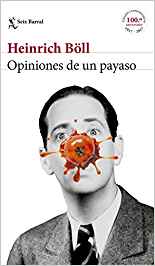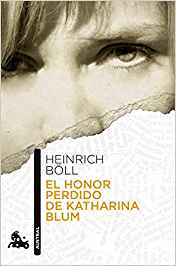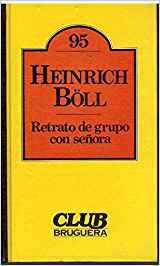Heinrich Boell He is the stereotype of the self-taught writer, a prestigious self-made narrator. His passion for literature came from when he was little, but his life took other paths when he ended up being mobilized by the German army. It is not that Böll was a follower of Nazism, in fact he repudiated it for a long time, but in the end he was led to fight on the side of the regime that marked the designs of his country.
Fighting without being very convinced of his cause, being taken prisoner by the allies, suffering the death of a son during the aftermath of World War II. All that left a considerable residue for the latent writer within him.
And the writer ended up emerging. Their The first stories published by different magazines and newspapers illuminated the novelist who ended up breaking into force in 1949 with The train arrived on time. Of course, those hard years of devastated Germany did not give rise to great artistic and literary boasts. But Heinrich BoellWith that story that revealed the post-traumatic stress of the combatants, it earned him prestige.
Little by little Heinrich Böll made his way ..., but to elaborate more on his process would already be to tell his whole life. The point is to try to point out those three recommended books by Heinrich Böll, and with it I put:
Opinions of a clown
This book that I reviewed very recently It is, for me, his great novel. Summary: The life of Hans Schnier has stopped for the reader. In the absence of an introspection exercise of his own, the now-defunct Heinrich Böll offers us a glimpse into the detained life of this unique character Hans Schnier.
The truth is that the fact that we stop to think about what we have traveled and what we have left to go is seldom a good indication. Vital inertia is often the best decision as we try to put our transitory affairs in order. Hans meets the loser profile.
He works less and less as an actor, Marie, the woman who perhaps once loved him already loves another and the money is determined to escape from a home in ruins. And there we have Hans, clinging to the landline of his house, looking for someone to call.
The world is not a glorious advance either. We are in Bonn in the post-war era, after the second bleeding of Europe and the fall of the Nazi empire.
Between his particular destiny that seems to get more and more muddied in the present, and the destiny of a Germany that is searching for itself among the rubble and dust of its moral and political misery, the truth is that Hans does not know very well where to move. So at the moment he doesn't move. He keeps calling and calling contacts, he looks for a clue about Marie, knowing that she doesn't matter, that nothing can be put back together because perhaps it was never put together.
Love could have been the tinsel with which he adorned his few nights of glory. But Hans needs to find some hope so he doesn't fall apart. Going through a painful present ties Hans to a slow, heavy, dying existence.
The magic of this novel is the level of insight in the person sitting at the phone. His memories are moving us through the movie of his life to present the moments in which he was happy.
Time and time again we contemplate the man reduced to rubble and we assault his imagination to once again fly over his existence. A journey into the interiors of Hans that ends up being a history of Europe during his time, halfway between imperial Germany and the annihilated empire.
Katharina Blum's Lost Honor
Depending on when a book is read, one intention or another of the author can be guessed. What at the time could be understood as a moralistic work, now becomes a parody of the morality that prevailed long ago.
Summary: After attending a party, Katharina Blum spends the night with a man she has just met. The next morning, Katharina discovers that her companion is suspected of various crimes. From then on she will be accused of being an accomplice.
The press, the police and the justice system will unite to destroy his reputation, even to make his life hell. With a style that combines the police report and the newspaper article, Heinrich Böll makes a passionate criticism of the sensationalist media and the abuse of the mechanisms of power. In his day Katharina Blum's Lost Honor it was a great sales success.
Group portrait with lady
For many, this is the fundamental work of Böll, because of what it means as a social portrait of any type of town, city or region.
Summary: Group Portrait with Lady, originally published in 1971, is one of Heinrich Böll's seminal works, and also one of his main public success stories. Using a narrative technique that is both agile and complex, which combines the detective survey and the report, Böll builds a mosaic of an entire society, from its highest strata to those who live in the open.
A moral apologist and a satire of genuine grandeur, Group Portrait with a Lady is already a classic of the contemporary novel that revealed the roots of the current crisis in Europe.



